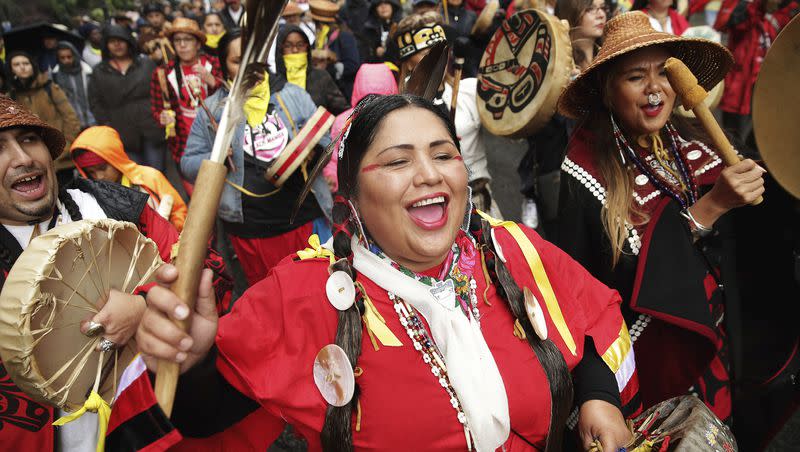Happy National Columbus Day and Indigenous Peoples Day! More on both holidays — and the complicated history of the two

- Oops!Something went wrong.Please try again later.
After a nearly 10-week voyage from Palos, Spain, Christopher Columbus spotted the shores of San Salvador on Oct. 12, 1492, according to the Library of Congress. Though he thought he had found a new route to Asia, his voyage to the New World changed the course of history.
Columbus Day is celebrated on the second Monday in October in the United States, but it hasn’t always been that way.
What is the history of Columbus Day?
Catholic and Italian groups celebrated the very first “Columbus Day” in 1792 at Tammany Hall, per History. They held various religious ceremonies and parades in honor of their heritage and his accomplishments.
A century later in 1892, U.S. President Benjamin Harrison encouraged Americans to honor the 400th anniversary of Columbus’ arrival. He described Columbus as “the pioneer of progress and enlightenment.”
He said, “On that day let the people, so far as possible, cease from toil and devote themselves to such exercises as may best express honor to the discoverer and their appreciation of the great achievements of the four completed centuries of American life,” per the University of California, Santa Barbara.
In the following several decades, a Roman Catholic fraternal benefit society, the Knights of Columbus, began lobbying for Columbus Day to be registered as a national holiday on Oct. 12, according to the Library of Congress.
The first state to register Columbus Day as a legal holiday was Colorado on April 1, 1907. New York followed in 1909. Then, in 1934, President Franklin Roosevelt approved Columbus Day as a federal holiday, setting it as the second Monday of October, per the Smithsonian.
President Joe Biden declared Indigenous Peoples Day a federal holiday in 2021, and set the date also as the second Monday of October, per The Associated Press.
Why is Columbus Day controversial?
CNN lists several reasons why celebrating Columbus has become controversial in the last several decades.
“He wasn’t the first to discover the Americas,” citing that Leif Eriksson and the Vikings made their way to the New World 500 years earlier.
“He enslaved the natives.” Columbus “sent thousands of Taino ‘Indians’ to Spain to be sold, and many of them died during the journey.” Per CNN, during his time in the Dominican Republic, Columbus publicly displayed dead bodies on the streets to “prevent further rebellion.”
“He brought new diseases.” The nonprofit organization Teach Democracy reported that “the first smallpox epidemic in the New World began in 1518 on Hispaniola among the Taino.” The organization said that nearly half of the Taino population, roughly half a million people, were dead within two years. “Within 100 years, the Taino were extinct, mainly due to smallpox and other diseases.”
What’s open on Columbus Day?
Most things remain open on Columbus Day, including FedEX, UPS, most public schools, the Stock Exchange and the Nasdaq Stock Market.
U.S. postal offices, Federal Reserve’s banks including Bank of America, Citibank, Regions and Wells Fargo, and New York City public schools, however, will be closed.
How can you celebrate Indigenous Peoples Day?
Cliff Matias, cultural director of the Redhawk Indigenous Arts Council, explained Indigenous Peoples Day to PBS, saying it was placed on Columbus Day to celebrate Native Americans’ “survival of Columbus and all that he brought.”
Nick Tilsen, who is Oglala Lakota, told PBS he spends the day before Indigenous Peoples Day protesting memorials to Columbus and participating in Native American celebrations, including performances, food, music, art and traditional ceremonies.
Tilsen said that Indigenous Peoples Day is not only meant to recognize the painful history Indigenous people have faced, but it is also “a day of protest and resistance.”
The Smithsonian encouraged people to celebrate Indigenous Peoples Day as opposed to Columbus Day, saying, “Celebrating Columbus and other explorers like him dismisses the devastating losses experienced by Indigenous Peoples of the Western Hemisphere in the past and the ongoing effects of colonialism today.”

